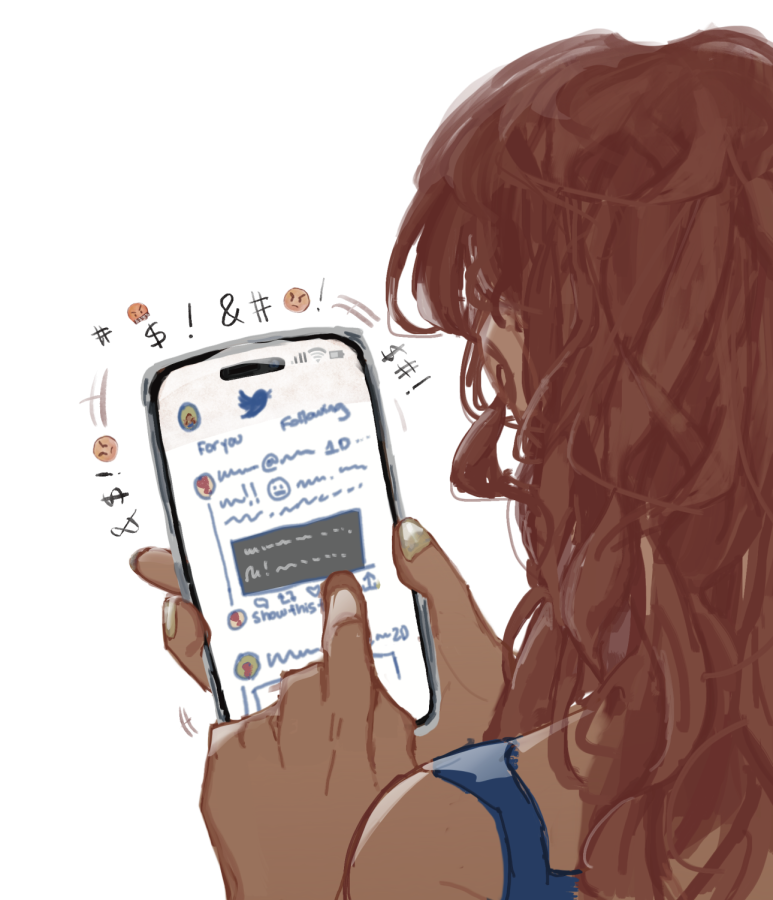Musk alters Twitter work culture, content
June 22, 2023
Designer and former Twitter employee Danny Yee turns on his monitor and scrolls through his Twitter feed. He smiles as he reads the latest news on SpaceX’s starship launch and laughs as he watches a video that applies a new AI image recognition model to a segment from “The Office.”
Twitter is Yee’s favorite platform to catch up on the latest science, engineering and technology developments. And like many other Twitter users, the platform’s focus on delivering real-time, breaking news gives Twitter part of its popular appeal.
However, Tesla and SpaceX founder Elon Musk recently became Twitter’s owner and CEO, closing a deal to buy the company for $44 billion, and he has made changes that some users like Yee say could change the platform’s direction.
While Musk says he bought Twitter to promote free speech on the platform, software engineer Yanning Chen, who worked at Twitter until Musk’s takeover, said Musk’s primary goal is profit.
“When the acquisition happened, Twitter transitioned into a platform dominated by Elon’s own ego,” Chen said. “He desperately wants to monetize it because he spent $40 billion to buy it out. There’s lots of bricks in the engineering infrastructure and also relationships with existing advertisers are not going well, therefore a lot of money has been pulled from Twitter.”
Although Musk may be on monetization, Chen said many of the CEO’s new policies are hurting Twitter’s advertising revenue, which dropped over 50% since Musk took over. Chen said Musk lowered the strictness of Twitter’s content filters, originally to promote free speech, but these altered filters have threatened brand safety for advertisers, driving them to other platforms such as Facebook and Google.
“Lots of advertisers just decided to leave the platform because it has almost become an industry standard that platforms should guarantee brand safety, however, Twitter has just breached that,” Chen said.
In addition to revenue issues, Chen said Twitter moved its backend infrastructure from an on-site data center to cloud servers in 2020. According to Chen, Twitter is paying for costly cloud hosting services, and it is difficult for the company to switch back to cheaper self-hosted servers.
“When Elon realized (cloud servers) cost too much and wanted to migrate things back to the on-premise data center, we realized that the people who were in charge of the on-premise infrastructure were already gone,” Chen said. “The institutional knowledge did not exist anymore, and nobody knew how to maintain those jobs.”
And according to Chen, engineers have also been leaving Twitter because it has become a more challenging environment to work in since Musk took over.
“In a meeting, some top engineers got fired because they just explained the truth that (some of Elon’s tweets) don’t seem to be that popular anymore,” Chen said.
Chen also said Musk has not encouraged employees to challenge his ideas, focusing on executing his monetization and feature plans as efficiently as possible. An email sent to Twitter’s press account with a request for comment received an autogenerated reply with a single poop emoji.
Designer Danny Yee, who worked at Twitter until 2021, said Musk has also strayed away from the company’s original mission of being an inclusive and diverse platform for communication because of his monetization efforts.
“Towards the end of my time at Twitter, there was a big push to encourage healthy conversation on the platform,” Yee said. “We were making big strides there, and that was indicative of why you saw big advertisers showing up on the platform. They thought it was a safe and healthy place to be.”
As a frequent Twitter user, Yee said he noticed more toxic content from accounts he was less interested in immediately after Musk took over. “I was seeing more voices from people that I didn’t follow,” Yee said. “They tended to be politically different from what I saw before. There were a lot more conservative voices, and it did feel like they were more toxic conversations on the platform. More recently, though, that has fallen off, and I’m starting to see more of the things that I enjoy seeing.”
Senior Rigel Cierniak, who also uses Twitter frequently, said they noticed that political discussions on Twitter have become more polarized.
“There are different bubbles that people isolate themselves in, but I think (Twitter) has become increasingly polarized,” Cierniak said. “I’m not sure if this is because of Twitter itself or if it’s a wider political thing, but I definitely notice more radical opinions on both the left and the right.”
Cierniak said Twitter has also been more unstable due to fewer content restrictions and features, such as image cropping, and feature changes without prior warning.
“One time, images were down for an entire day which was not something that happened super regularly before,” Cierniak said. “Content regulation has been a lot more (relaxed) in different ways, which could be good or bad, but I’ve noticed more hate speech. Also, a lot of features are being changed and removed without notice when normally there would be a testing period.”
But according to Yee, Musk’s style of experimentation and rapid iteration could improve the company in the long run.
“It’s great to see that they’re testing out features,” Yee said. “They seem to be testing a lot more features that support creators in a good way, which I think is great because YouTube and TikTok do that better.”
And Cierniak said Musk’s content changes will not affect how they use the platform.
“I’ve always used it very personally with my friends,” Cierniak said. “Political things have not been super important to me. If there is a point where Twitter genuinely becomes unusable either due to technical issues or if all my friends leave the site because they don’t want to use it anymore, then I probably will leave it too.”
And Yee said he will continue using Twitter because it is still the most convenient place to get the latest news and updates on the topics he follows.
“One of the things that Jack Dorsey was fond of saying about Twitter was that if you’re trying to figure out what’s happening in the world, (browsing Twitter is) actually easier than looking out your window,” Yee said. “I love that about Twitter.”
Ultimately, Yee thinks Twitter is an effective platform for public discourse, which will continue to grow, but Musk could pay more attention to the voice of the community.
“Twitter is not rocket science,” Yee said. “I love seeing what Elon Musk is doing in his leadership at SpaceX and Tesla, but Twitter is not the same type of thing as Tesla or SpaceX. It really is more about community and relationships, and I don’t think the current leadership of Twitter is recognizing how important that is.”






